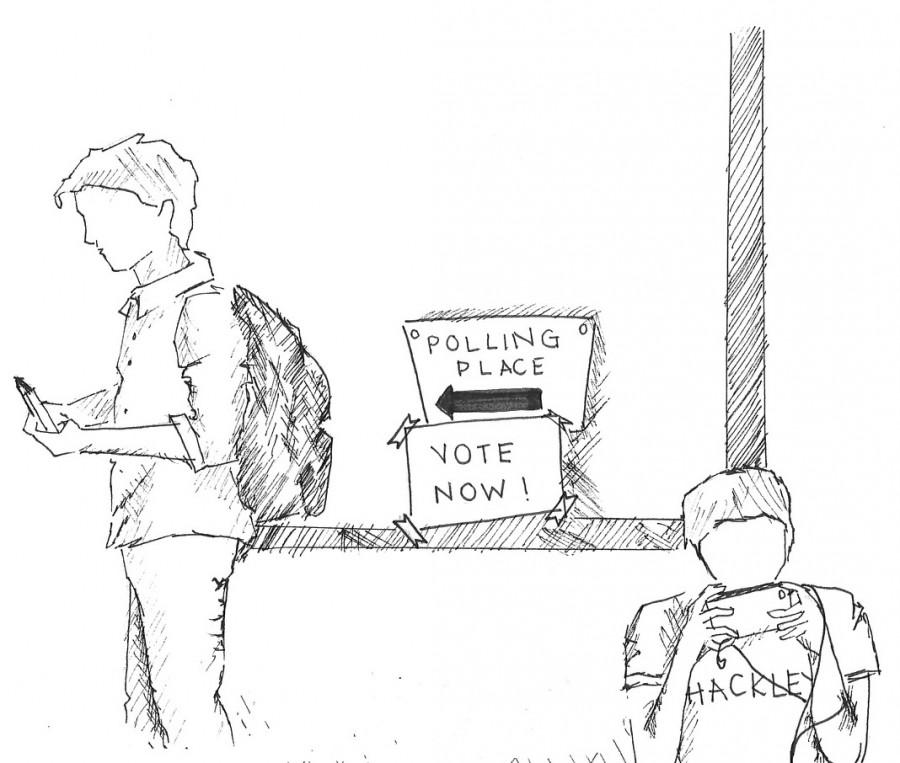Hackley Seniors Eagerly Prepare to Vote in 2016
Credit: Lei Anne Rabeje
February 16, 2016
As the United States presidential election on November 8, 2016 approaches, Hackley’s seniors are anticipating their first time voting. Many are enthusiastic about the idea of fulfilling their new-found responsibilities as legal adults, while others are excited for the experience of finally casting a ballot after years of waiting.
Enthusiasm among Hackley seniors for voting in the upcoming presidential election greatly contrasts with statistics provided by United States Census Bureau on voter turnout from past presidential elections. Overall, U.S. presidential voting turnout has been declining since 1976, with widening gaps according to age, race, education, and income. A recent data table published by the U.S. Census Bureau illustrates a spike in voter turnout for the 2008 presidential election, which drastically decreased during the 2012 election.
According to Journalist’s Resource, an average of 60% of qualified American voters have cast ballots in recent presidential elections. Turnouts in congressional, senatorial, and gubernatorial elections are even lower, ranging between 28% and 58% in various states.
Senior Phebe du Pont speculates about the lack of voter turnout in recent years. “Part of it definitely comes down to a lack of faith in our system. A lot of people are disillusioned with the current political situation and they find it pointless to vote,” said Phebe, “If everyone holds the opinion that their individual vote doesn’t matter, they become discouraged; nobody votes and you actually have a massive impact. I think a lot of it is how we perceive our votes and their impact.”
Attempts to reform the electoral college were made in 2007 when the National Popular Vote bill was proposed, which attempted to ensure that every vote in every state created an impact. However, the reform has not yet significantly affected the electoral process, with only non-swing states having signed the compact. Swing states — Ohio, New Hampshire, and Colorado — along with Florida, Virginia, Nevada, Iowa, Wisconsin, and Pennsylvania had a 98.6 percent chance of determining the electoral college winner in 2012, according to FiveThirtyEight. With such great influence exerted on the election by swing states, individuals in non-swing states may be discouraged from casting their ballots.
Senior TJ Gooley suggested alternative reasons for the declining voting turnout, ranging from lack of understanding to laziness. “It’s a lot easier for people to complain about things than to actively fix it and search for a solution to a problem,” said TJ. “A lot of people vote blindly: they only go for a certain party or what their parents think, instead of thinking for themselves.”
Senior Alexander Delia believes that such dismal voting turnout rates can be attributed to a combination of apathy and lack of understanding. “Some people just don’t know or don’t care. Some people don’t understand politics enough; they think that they are unaffected by politicians. They think, ‘It’s not my role or it’s not my field of expertise, so I shouldn’t be involved,’” he said.
A study by Journalist’s Resource supports Alexander’s speculation, projecting that voting turnout rate varies with education received; the highest education group had approximately 78% voter turnout, compared to 60% for the middle education group and 50% for the lowest education group.
Voting turnout has declined for all age groups, particularly for voters between the ages of 18 and 24. In the 2012 presidential election, approximately 38% of individuals between ages 18 to 24 cast a ballot versus 44% in 2008.
Senior Ella Charkes contemplates the lack of voter turnout for young adults, believing there is a disconnect between candidates and youth. “I don’t think a lot of candidates try to relate to younger people,” she said. “A lot of it is about the economy or things younger people may not understand, so they don’t vote because they don’t feel impacted by the candidates.”
Most of Hackley’s seniors are eagerly anticipating their first time casting a vote, but many feel that Hackley should have played a larger role in teaching students about elections and the voting process. “It would be good for Hackley to offer a course on skills necessary for living and are highly important as we enter adulthood,” said TJ. “Maybe teach us about the process of voting, how to register for military drafts, filing taxes. Instead, we have to rely on learning from our family and friends.”
“A lot of us, as teenagers and high school students, don’t really see ourselves as adults or voting citizens — that’s kind of a grown-up thing. I think Hackley should have a workshop for seniors or students in their history classes. I took the Government and Politics course and Mr. Fitzpatrick spent a lot of time talking about how horrible voting turnout has been in the U.S. right now and how messed up the system is,” said Phebe. “If we could find a way to incorporate that kind of teaching into regular history classes or an info session, that would be a good way to promote that sense of awareness. It is a civic duty to vote, but a lot of students don’t see it as our responsibility to fulfill that duty.”

